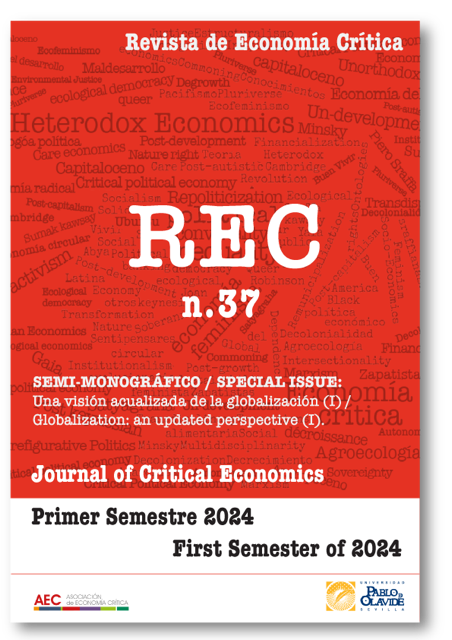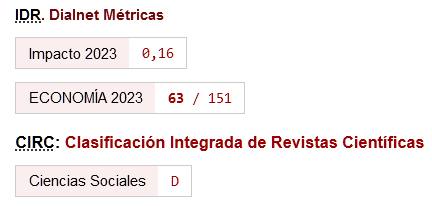Hacia una nueva arquitectura para una imposición al capital progresiva
DOI:
https://doi.org/10.46661/rec.10712Resumen
La aplicación y funcionamiento de las Reglas Globales contra la Erosión de Bases (GloBE) acordadas en la OCDE y publicadas en diciembre de 2021 tienen fortalezas y debilidades para los países en desarrollo. Ahora es el momento de abordar directamente la "arquitectura" institucional multilateral en relación con las negociaciones fiscales internacionales. A pesar de las tensiones geopolíticas actuales, la naturaleza del cambio climático y la mayor posibilidad de futuras pandemias sanitarias han hecho que la necesidad de provisión de bienes públicos globales –y, por tanto, de coordinación fiscal global– sea aún más necesaria. Además, las reglas de GloBe reflejan la subrepresentación de los países no miembros de la OCDE en el proceso del "Marco Inclusivo", como lo demuestra su ausencia en el liderazgo de comités clave, la escasez de delegados especializados y la falta de derechos de voto explícitos. Por lo tanto, es correcto acoger con agrado la reciente resolución de la ONU de trabajar hacia un Convenión Impositivo mundial.
Descargas
Citas
Aslam, Aquib and María Delgado Coelho (2021): "A Firm Lower Bound: Characteristics and Impact of Corporate Minimum Taxation." IMF Working Paper WP/21/161. Washington, DC: International Monetary Fund. https://doi.org/10.5089/9781513561073.001
Crivelli, Ernesto, Ruud De Mooij, and Michael Keen (2015): "Base Erosion, Profit Shifting and Developing Countries." IMF Working Paper WP/15/118. Washington, DC: International Monetary Fund. https://doi.org/10.5089/9781513563831.001
Ferreira Liotti, Belisa, Joy Waruguru Ndubai, Ruth Wamuyu, Ivan Lazarov and Jeffrey Owens (2022): "The treatment of tax incentives under Pillar Two." Transnational Corporations Vol. 29 No. 2. Geneva: UNCTAD. https://doi.org/10.18356/2076099x-29-2-2
FitzGerald, Valpy (2012): "Global capital markets, direct taxation and the redistribution of income." International Review of Applied Economics, 26:2, 241-252. http://dx.doi.org/10.1080/02692171.2011.640313
FitzGerald, Valpy and Erika Dayle Siu (2019): "The Effects of International Tax Competition on National Income Distribution." pp. 243–272 in Ocampo, José Antonio ed. International Policy Rules and Inequality. Columbia University Press, New York. https://doi.org/10.7312/ocam19084-009
G20/OECD (2021): Two-Pillar Solution to Address the Tax Challenges Arising from the Digitalisation of the Economy. Paris: OECD.
ICRICT (2019): International corporate tax reform. October, 2019. (www.icrict.org)
ICRICT (2022): It is time for a global asset registry to tackle hidden wealth. https://www.icrict.com/it-is-time-for-a-global-asset-registry-to-tackle-hidden-wealth.
IMF (2022): Fiscal Monitor. April 2022. Washington, DC: International Monetary Fund.
IMF (2023): International Corporate Tax Reform, IMF Policy Paper. Washington, DC: International Monetary Fund. https://doi.org/10.5089/9798400232558.007
Klemm, Alexander and Stefan van Parys (2012): "Empirical evidence on the effects of tax incentives." International Tax and Public Finance, Vol. 12, pp. 393–423. https://doi.org/10.1007/s10797-011-9194-8.
OECD (1998): Harmful Tax Competition: an emerging global issue. OECD, Paris.
OECD (2022): Tax Incentives and the Global Minimum Corporate Tax: Reconsidering Tax Incentives after the GloBE Rules. OECD, Paris.
Stausholm, Saila Naomi (2017): Rise of ineffective incentives: New empirical evidence on tax holidays in developing countries. Copenhagen Business School. https://doi.org/10.31235/osf.io/4sn3k
UN (2001): Report of the High-level Panel on Financing for Development ('Zedillo Commission'). New York: United Nations.
UN: The 17 Sustainable Development Goals. https://sdgs.un.org/goals.
Zee, Howell H., Janet Gale Stotsky and Eduardo Ley (2002): "Tax Incentives for Business Investment: A Primer for Policy Makers in Developing Countries." World Development, Vol. 30(9), pp. 1497–1516. https://doi.org/10.1016/S0305-750X(02)00050-5
Descargas
Publicado
Cómo citar
Número
Sección
Licencia
Derechos de autor 2024 Revista de Economía Crítica

Esta obra está bajo una licencia internacional Creative Commons Atribución 4.0.
Esta licencia permite a terceros compartir (copiar y redistribuir el material en cualquier medio o formato) y adaptar (remezclar, transformar y crear a partir del material para cualquier finalidad, incluso comercial), siempre que se reconozca la autoría y la primera publicación en esta revista (La Revista, DOI de la obra), se proporcione un enlace a la licencia y se indique si se han realizado cambios en la obra.







